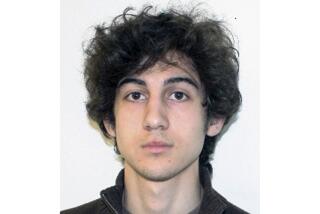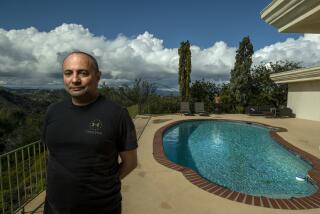Tamerlan Tsarnaev sought to rename himself after militant
- Share via
WASHINGTON — Less than three months before the Boston Marathon bombings, a bitter, frustrated Tamerlan Tsarnaev visited a federal immigration office in the Boston area and signed forms seeking to legally change his first name.
Eager to recast himself in the model of a well-known rebel figure killed by Russian forces in 2009, Tsarnaev chose as his new name “Muaz,” according to a previously undisclosed Homeland Security Department petition form, which was obtained by The Times. It was not only a tribute to Emir Muaz, a celebrated fighter in Russia’s Dagestan republic, it was also the nickname rebels had given Tsarnaev during his six-month visit to the region in 2012, law enforcement officials say.
Asked as part of the Jan. 23, 2013, application to explain his name change request, Tsarnaev described the decision in political terms, according to a federal law enforcement official close to the Boston bombing case. “He said, ‘The Russian people have been terrorizing my home country for all these years.’ This is why he needed to come back to America and help,” the official said.
A year after twin explosive-laden backpacks killed three people and injured more than 260 others at the Boston Marathon, the name-change petition is part of a growing body of evidence that portrays Tsarnaev as more radical and organized than previously believed.
Defense attorneys for his younger brother, Dzhokhar Tsarnaev, say the older sibling may have been set off by what he believed was FBI pressure and attempts to recruit him as an informant.
The emerging picture of Tamerlan Tsarnaev, who was killed as U.S. agents tried to arrest him days after the bombings, is likely to play a key role in the upcoming defense of his brother. Attorneys for Dzhokhar Tsarnaev are expected to argue that his brother took the lead role in what became the worst domestic terrorist attack since Sept. 11, 2001.
U.S. authorities believe Tamerlan was deeply radicalized during his 2012 visit to Dagestan, which, along with adjoining Chechnya, is home to an Islamist insurgent movement. They say he made an unsuccessful attempt to join the rebels and was either sent back to the U.S. to carry out a terrorist strike or took it upon himself.
“You’ve got to be pretty full into this to want to change your name and not be just a nobody named Tamerlan,” said the law enforcement source, who requested anonymity because the case is ongoing. “Maybe he thought because he could not get accepted over there, maybe he could do something here.”
At the bottom of the name-change form, Tsarnaev was advised that he would be required to take an oath of allegiance to the United States, including potentially serving in the U.S. armed forces. Rather than sign that part, he printed his name, then crossed out “Tamerlan” and changed it to “Muaz.”
Tsarnaev’s anger toward the U.S. was fueled by what he perceived as pressure from American law enforcement agents to work for them, according to his brother’s defense attorneys.
Though the FBI has said that it met once with Tsarnaev to discuss his visit to the Caucasus region, lawyers for his brother claimed in court filings March 28 that federal agents interviewed him multiple times, a process that they said increased his anger against the U.S.
In 2011, the Russian government asked the FBI to check on Tsarnaev, warning he might be preparing to travel to the Caucasus region. The FBI said it ran a series of checks, spoke with him and his parents, and reported back to Moscow that it had uncovered no links to terrorism.
But according to his brother’s lawyers, the FBI’s involvement went further. They said in court papers that there was “more than one” FBI visit to talk with Tsarnaev and his parents, that he was questioned about his Internet searches, and that the bureau “asked him to be an informant.”
“Tamerlan misinterpreted the visits and discussions with the FBI as pressure, and they amounted to a stressor that increased his paranoia and distress,” defense attorneys argued in the filings.
Federal prosecutors, however, told defense attorneys in a March 14 letter that they had “no evidence that Tamerlan Tsarnaev was solicited by the government to be an informant.” They did not comment on whether there were multiple FBI visits.
The image of Tsarnaev as a more radicalized fighter fits with the conclusion of a House Committee on Homeland Security report last month, which said he returned to the U.S. in 2012 with a near-manic desire to strike out against the U.S., evidenced in tirades he carried out at local mosques.
Signs of his radicalization also included a YouTube account he posted under his name that included Russian-language videos on Islam and play lists of militant videos he compiled, the committee report said.
The new revelations about Tsarnaev have prompted defense lawyers for his brother to characterize him as the key player who “supplied the motivation, planning and ideology behind the Boston Marathon attack,” according to recent filings.
Dzhokhar Tsarnaev has pleaded not guilty to using a weapon of mass destruction and other federal charges. If convicted at his trial this fall, he faces a death sentence.
His attorneys say Tamerlan “induced or coerced” Dzhokhar to take part in the attack and that the younger brother “acted under his domination and control.”
J. Reid Meloy, a clinical professor of psychiatry at the UC San Diego School of Medicine, who has worked on notable terrorist cases including the Oklahoma City federal building bombing, said an “undue or coercive behavior” defense can be hard to prove and difficult to sell to a jury.
In an interview, Meloy said that one of the few examples in which it worked was the 2002 Washington-area sniper case in which 10 people were killed and three injured. An adult killer was put to death, while his teenage protege, who looked up to him as a mentor and father figure, was given life in prison without parole.
“In my view of the evidence in the Boston case, I find no indication that the younger man had a psychiatric disorder,” Meloy said. But he added, “It now seems very clear that this may be the most viable and convenient defense for the younger Tsarnaev.”
More to Read
Sign up for Essential California
The most important California stories and recommendations in your inbox every morning.
You may occasionally receive promotional content from the Los Angeles Times.











